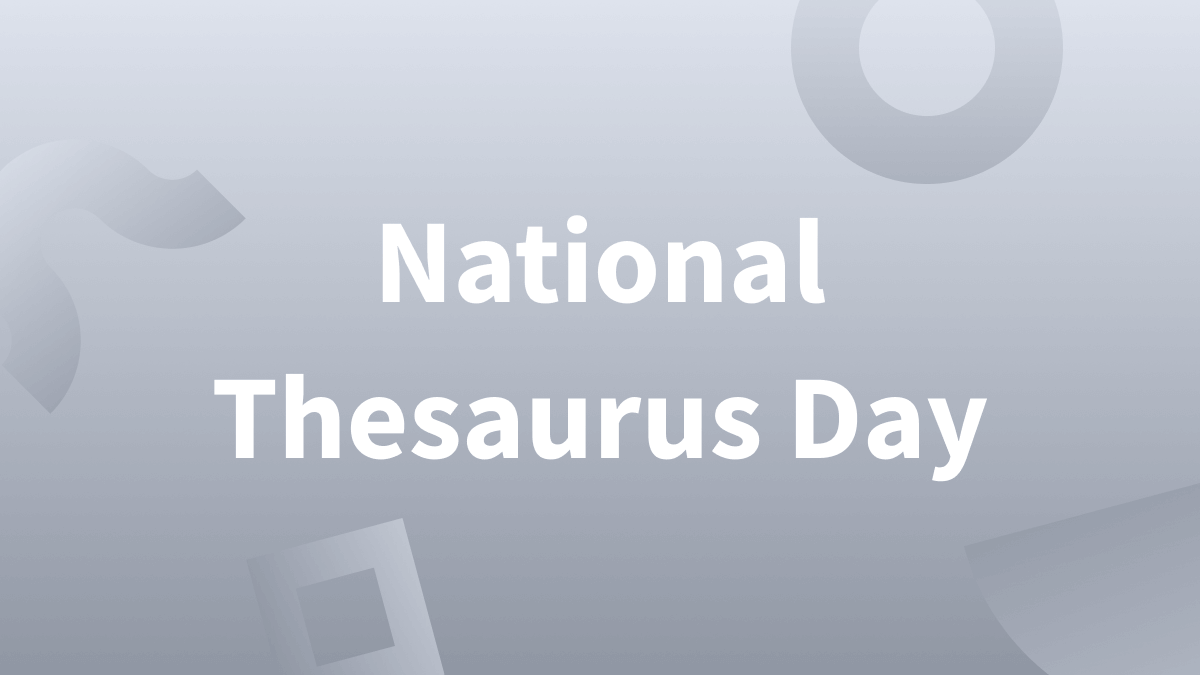History and Importance
- The word thesaurus comes from the Greek word “thēsauros,” which means “treasure,” “treasury,” or “chest.”
- Peter Mark Roget wrote the first modern thesaurus.
- Thesauruses provide easy access to a seemingly endless number of synonyms.
- Synonyms improve your writing because they help you avoid empty words and allow you to more accurately express yourself.
National Thesaurus Day
If you’re a word nerd like us, you might find yourself constantly searching for synonyms. You might even be curious about who created the thesaurus, when the first one was written, and how the word thesaurus came to be. In honor of National Thesaurus Day, which is celebrated in the United States on January 18, we decided to answer all your curiosities.

Thesaurus—Its History and Etymology
The word thesaurus comes from the Latin word “thēsaurus,” which was derived from the Greek “thēsauros.” The literal meaning of the Greek origin word is “a treasure,” “treasury,” “storehouse,” or “chest.” In other words, a thesaurus is a book, or “treasure chest” of synonyms.
“On Synonyms” is the first known thesaurus, and dates back as far as the late 1st Century. It was written by Philo of Byblos, a Greek writer, grammarian, and historian.
In the 4th Century CE, an Indian poet and grammarian named Amara Sinha wrote his version of a thesaurus in Sanskrit (a classical language of South Asia) as a long poem. One can only imagine how an English version of this type of thesaurus might read.
Fast-forward to 1805, where a British doctor named Peter Mark Roget started compiling a list of words arranged by meaning. He completed and published the first modern thesaurus in 1852. This version of the thesaurus is still in circulation today. The original name of Roget’s thesaurus perfectly encapsulates the importance of thesauruses and the synonyms they provide—“Thesaurus of English Words and Phrases, Classified and Arranged So As to Facilitate the Expression of Ideas and Assist in Literary Composition.”
Quick Tip
Synonyms enhance your writing. LanguageTool’s synonym function is intuitive and practical. All you have to do is double-click on a word to see all the possible alternatives you can use. It also picks up on common spelling and grammar mistakes, and suggests stylistic improvements.
On (the Importance of) Synonyms
When writing, you may get stuck trying to find the perfect way to express yourself. This is because certain words don’t carry the depth of the emotion, idea, or feeling you’re trying to articulate. This is when the thesaurus, and the seemingly infinite number of synonyms it provides, comes in handy.
Synonyms can make your writing more powerful by helping you avoid empty words like “really” and “very.” For example, let's say you’re a realtor trying to close on a house. Instead of saying it has a “very beautiful” view of the lake, you can say:
The house has a stunning view of the lake.
The house has a picturesque view of the lake.
The house has a glorious view of the lake.
The house has an exquisite view of the lake.
These synonyms carry more strength than the overused alternative.
Here are a few more synonyms that elevate your writing:
| Common adjectives | Alternatives |
|---|---|
| Happy | Cheerful, delighted, thrilled |
| Sad | Distraught, devastated, gloomy |
| Angry | Enraged, furious, livid |
| Small | Tiny, petite, minute |
| Nice | Charming, amicable, considerate |
| Big | Massive, gigantic, colossal |
| Useful | Beneficial, helpful, practical |
| Ugly | Grotesque, monstrous, hideous |
| Great | Astonishing, fabulous, stupendous |
Finding Synonyms by Using Thesauri
Because Philo of Byblos created the first known thesaurus and Peter Mark Roget compiled the first modern thesaurus, we live in a world where synonyms are just an online search (or double-click) away. It’s an astonishing/amazing/astounding thing to be able to write more powerful/compelling/influential texts by accurately conveying what you’re thinking.

